Volunteer in Ghana as a teacher’s assistant at a non-profit community school serving rural students ages 5-12.
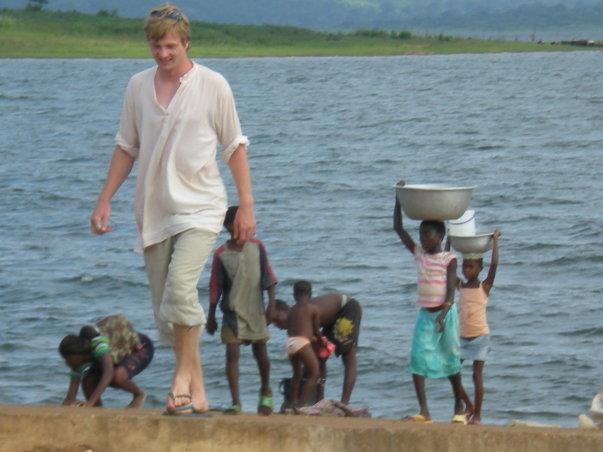

Volunteer in Ghana as a teacher’s assistant at a non-profit community school serving rural students ages 5-12.
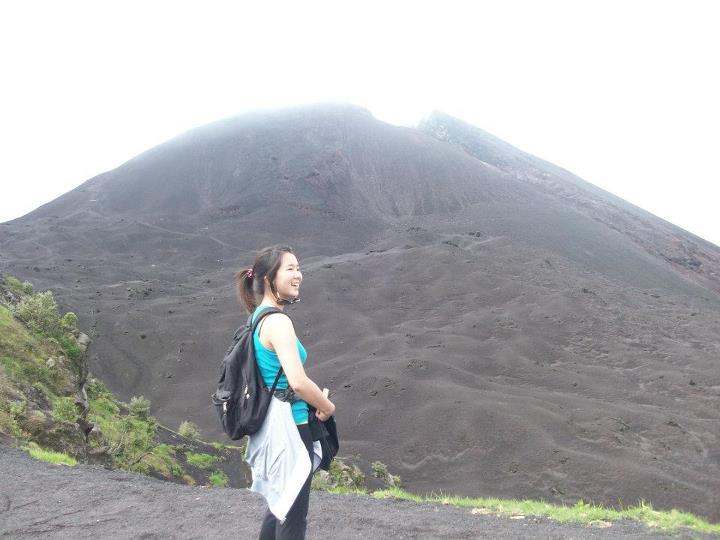
Spanish Language Immersion in Guatemala gives you the opportunity to study and practice the language while living with a local host family and volunteering at a local project. Continue Reading →

Flo from Progressive knows a lot of about insurance — but she won’t cover you on your volunteering trip abroad!
(But can you please take her with you and leave her lost in the Amazon jungle? Thanks!)
Read our article on Insurance When Volunteering Abroad to find out how you can get covered during your trip.
And — what to do if you need medical care abroad.
In Ghana in West Africa, people like to be buried in style, often in elaborate coffins that symbolize the life of the deceased. For example, a businessman might have a huge shoe coffin, or a pilot may have a coffin that looks like an airplane.
When you join one of our volunteer programs in Ghana, you will undoubtedly see coffin makers on the roadside doing their thing.
Paa Joe is Ghana’s most prolific coffin artist and, after five decades in the funeral industry producing some of the world’s most extravagant designs, his work is being celebrated in a major exhibition in Accra.
“People celebrate death in Ghana. At a funeral, we have a passion for the person leaving us – there are a lot of people, and a lot of noise,” says Jacob, 28, who has worked with his father for eight years.
Far from seeing their work as morbid, Jacob says the coffins are celebratory and reflect west African attitudes to death. “It reminds people that life continues after death, that when someone dies they will go on in the afterlife, so it is important that they go in style.”
Joe’s creations have attracted high-profile fans: Jacob recalls visits from Kofi Annan, the former UN secretary general, and the ex-US president Jimmy Carter, who reportedly purchased two coffins. Bill Clinton also stopped by during an official state visit to Ghana in 1998.
Living with a local host family while volunteering abroad is one of the most rewarding experiences of the trip. Sharing the same living space, meals and free time with a host family is truly the best way to learn firsthand about the culture and daily life in the community.
The host families in all of our host countries have been hosting foreign volunteers for many years. The family members have all been trained by us on all the big and small aspects of the job.
Your family provides you with all meals including breakfast, lunch and dinner. Most families eat meat but they accommodate vegetarians (rice, beans etc). Most food is spicy — although they will tone it down for you upon request. The host family also will have bottled water for you.
Let’s take Ghana in west Africa as an example:
Here is one of our actual host families!
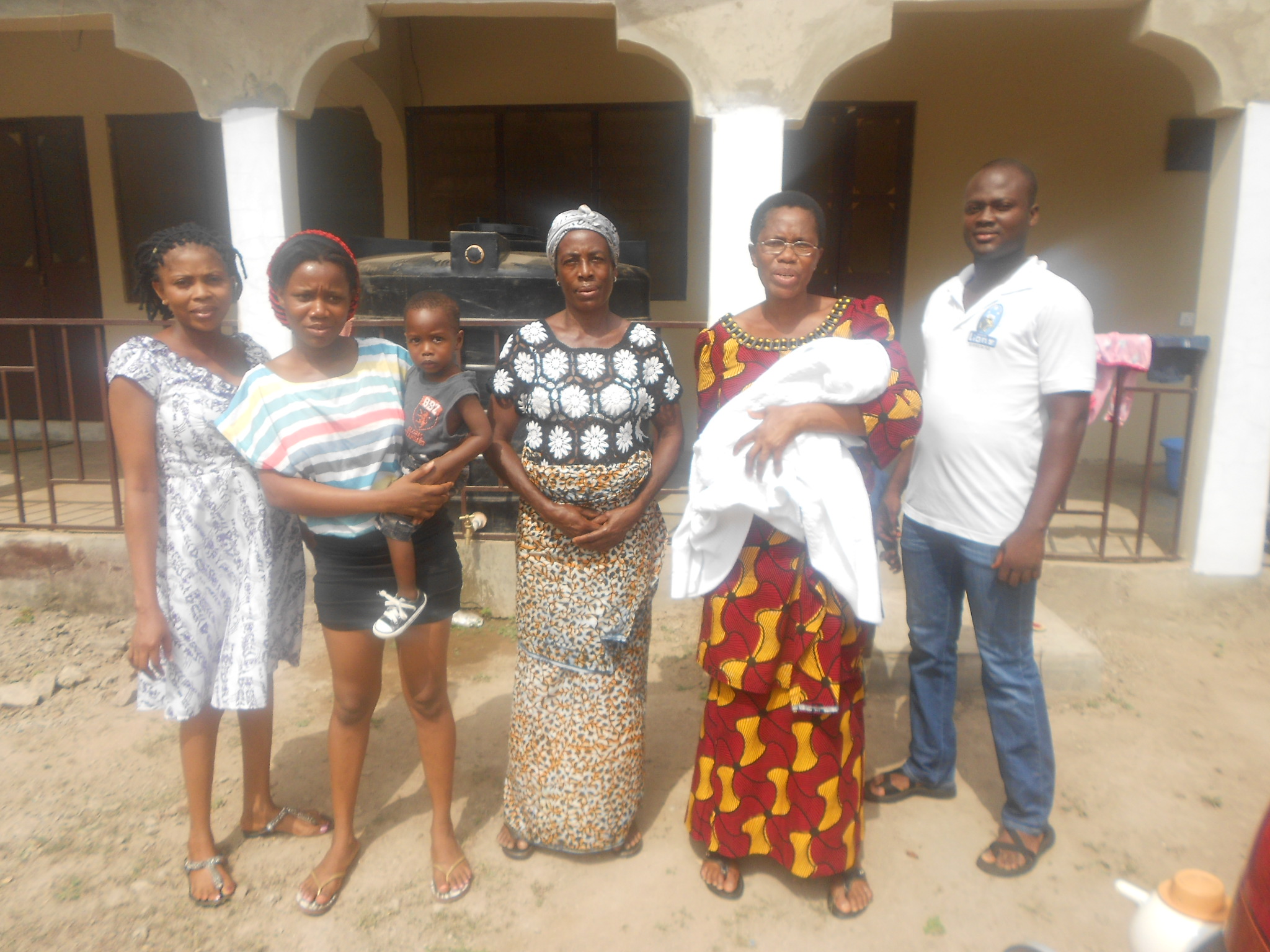
This particular host family is in the apartment on the right:

The living room:

Beds are usually hard as a rock:
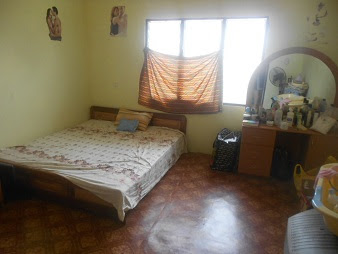
Toilets at Host Families are western design. The flush handle does not work usually. To flush, fill a bucket from the bathroom and dump it into the toilet. Use toilet tissue sparingly, as it clogs the pipes. When you travel around Ghana, carry a small roll of toilet tissue with you, as many places don’t have it.
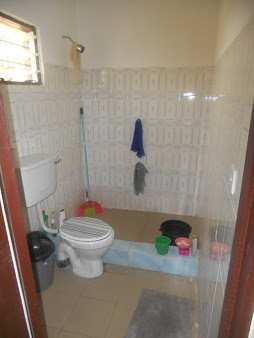
Personal Bathing:
When you’re volunteering abroad, you need to be prepared. This is more than just getting packed and knowing where you’re going. It doesn’t matter how old you are or where you’re going, here are five things you need to do to prepare for volunteering overseas.
Familiarize Yourself With the Culture
Know more about the culture of where you’re visiting. When you’re volunteering abroad, it can be difficult to fit in. The local people may feel like you have a sense of superiority, and may be turned off by your lack of respect for their way of life. Learn as much as possible about their culture, and avoid separating yourself from the locals.
What Are Your Expectations?
Make a note of everything that you expect to gain from your trip. It could be to build relationships with others or help certain types of people. When you have a bad day or something doesn’t go quite right, you can look back over your expectations and remind yourself of your goals.
Get Your Vaccinations
Depending on where you visit, you will need to make sure your vaccinations are up to date. There will be other vaccinations that you need to get for the specific areas, including malaria and typhoid. These need to be done weeks in advance, so require preparation.
What Are Your Skills?
You won’t be able to do everything while you’re volunteering abroad. You will need to think about your own skills, and determine the ones that you can offer while you’re out there. Put yourself in a position to be able to use your skills to help the local people.
Learn More About Volunteering
There is a lot to learn—good and bad. Go through each of them, and prepare yourself for everything that can happen in the place that you are visiting. What do others say about volunteering in that particular area or with that particular program you’ve chosen?
Once you get prepared, you are ready for your volunteering abroad. Remember to have fun and keep a journal to remember your trip.
You’re finally on-board your international flight for your volunteering trip abroad!
OK……Now what? How are you going to pass the time on the flight?
Actually we should say “flights” plural, because most of our volunteers need at least two flights to reach one of our volunteer destinations
And some of the flights can be over ten hours in the air. For example, if you are flying to Ghana from California, you will typically fly five hours to the East Coast to New York or Atlanta, then connect for your nine-hour flight to Accra.
Here are some ways for you deal with all this flight time!
1. The Usual Suspects.
Sleeping, reading, movies, music, journaling, and drawing. Also, more and more airlines — especially outside the US — are offering in-flight Internet access.
2. Mimic your destination’s time zone.
Stay awake and sleep according to the time zone in your destination. This will help you recover from any jet lag symptoms, allowing you to adjust more quickly to the local time zone.
3. Talk to fellow passengers.
Shy? Intimidated by all those accents, saris, hijabs, or African headdresses of your fellow passengers? So what! Get over yourself :=). Smile and say hello to people. Resist the temptation to put your ear buds in and consciously cut yourself off from the other passengers. Perhaps you’ll make a new friend, and maybe learn about your destination – especially if the folks you talk to are returning home.
4. Look out the window!
You are 30,000+ feet above the earth! Isn’t is amazing to see the clouds, stars, the moon, the ocean, even other planes from this perspective? You’re traveling perhaps half-way around the world in less than 24 hours. These things were unfathomable to humans not even a century ago. Consider yourself very fortunate.
5. Take photos and videos.
Capture yourself, the scenery out the window, perhaps even a new friend(s). You might not realize it now, but looking at these photos and images after the trip – especially after many years – will keep your memories of this special trip alive and vivid for you and others.
For all of our teen volunteer trips abroad, Cosmic Volunteers provides 24 hour supervision. Here’s how it works:
You are only allowed to leave the premises of your host family if you are accompanied by at least one of the following people: Host Family Parent, Trip Supervisor, Country Coordinator, or Group Leader from Home. This includes program activities as well as free time. For example, even if you want to rise early for jogging – you must do so with one of the people mentioned above.
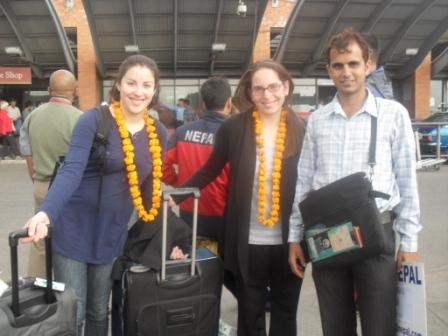
Arriving at the airport in Kathmandu, Nepal
Trip Supervisor from U.S.
A staff member from Cosmic Volunteers in Philadelphia will travel to the host country to serve as the full-time Trip Supervisor (TS). The TS will be the main supervisor and 24 hour contact in the host country for both you and your parents back home. The TS is available to accompany your group on the flight from home to the host country if you prefer. For example if you live in the Los Angeles area, our TS will fly to L.A. several days before your departure then go on the same flight with you to the host country.
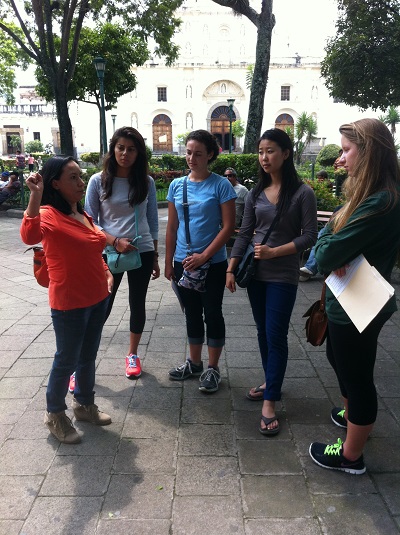
Orientation in Antigua, Guatemala with our Local Coordinator
Local Country Coordinator
We have a full-time Country Coordinator (CC) in all of our host countries. The CC is always a native of the host country; so of course they know the culture and speak the local language(s) fluently. The CC will serve as the local supervisor and also be available 24 hours to your parents back home. Our CC will meet our group at the airport in the host country. They will work with the TS to provide a detailed orientation, accompany you to the host families, supervise the volunteer work and excursions, and be available 24 hours for emergencies.
Group Leaders from Home
We encourage you to have at least one Adult Group Leader from home go on the trip. This can be a teacher, school administrator, or even a parent. There is no age requirement for adult group leaders. Having a teacher on the trip can be especially important in helping students put aspects of their school’s curriculum into practice.
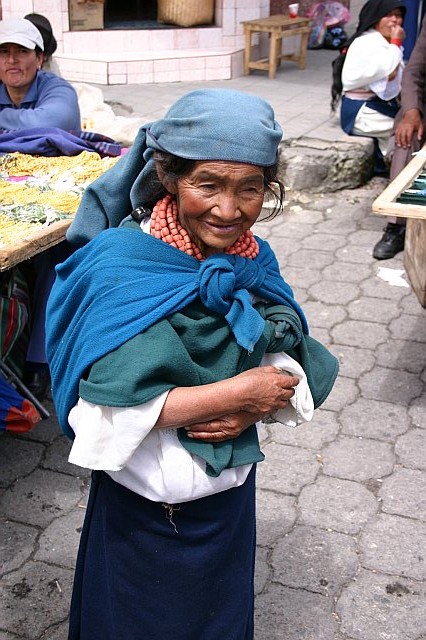
Altitude sickness can become a problem for travelers around the world.
Travelers joining our volunteer programs in the South American cities of Quito in Ecuador and Cusco in Peru occasionally experience mild symptoms of altitude sickness upon arrival.
Quito’s elevation is 9,300 ft (2,850 m) above sea level, making it the second highest capital city in the world.
Cusco sits at 10,800 ft (3,300 m) above sea level.
Adjust to the high altitude when volunteering abroad:
I’ve flown into Quito several times — the first in 2003 — and been affected each time by the altitude. Especially the first time, I felt very dizzy while walking from the plane to the immigration counter. After a couple days of headaches and mild nausea, I adjusted OK to the altitude each time.
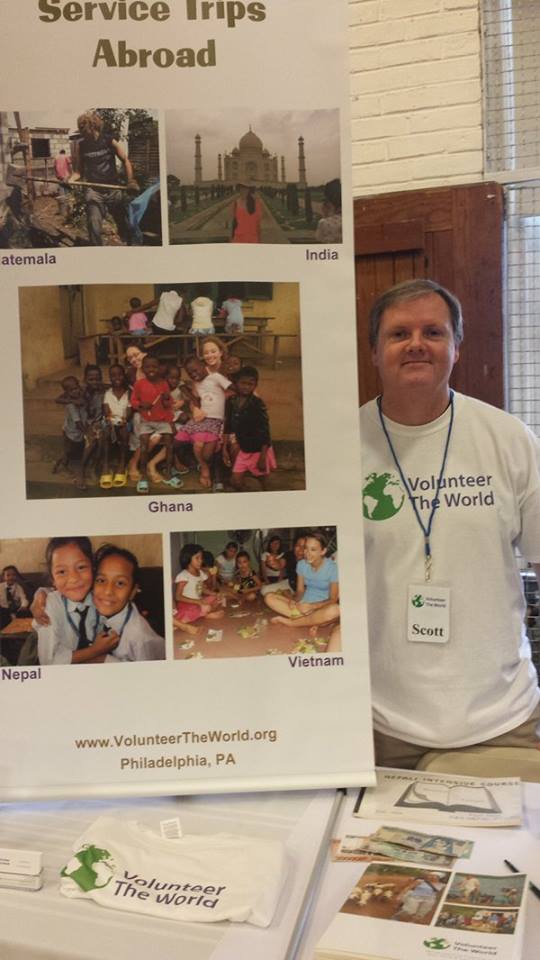
We were happy to have a table last Saturday at the Gap Year Fair hosted by Penn Charter. The fair was open to interested students and families from Penn Charter and other area schools.
We presented our gap year program “Volunteer The World” to prospective students.
Special thanks to Kathy Cheng, director of USA Gap Year Fairs, who was in charge of putting on the fair and made us all feel so welcome!
The gap year fair began with a one hour talk on the gap year concept by Holly Bull, president of the Center for Interim Programs. Students and parents were then able to meet representatives of various gap year programs including Cosmic Volunteers’ “Volunteer The World.”
What is a “Gap Year”?
Gap year programs are designed for recent high school graduates age 18+ who are deferring their first year of college to travel abroad or even domestically.
Participants engage in meaningful experiences like volunteer work abroad, language study, internships, excursions, adventure travel.
After returning home they are more mature, focused and confident and ready for their first year of college and beyond.
Gap Year is a trending conversation among families and schools, and many colleges encourage students to take a semester or year away.
USA Gap Year Fairs are a source of information and an opportunity to connect with reputable gap year programs focused on education, service and personal growth.
